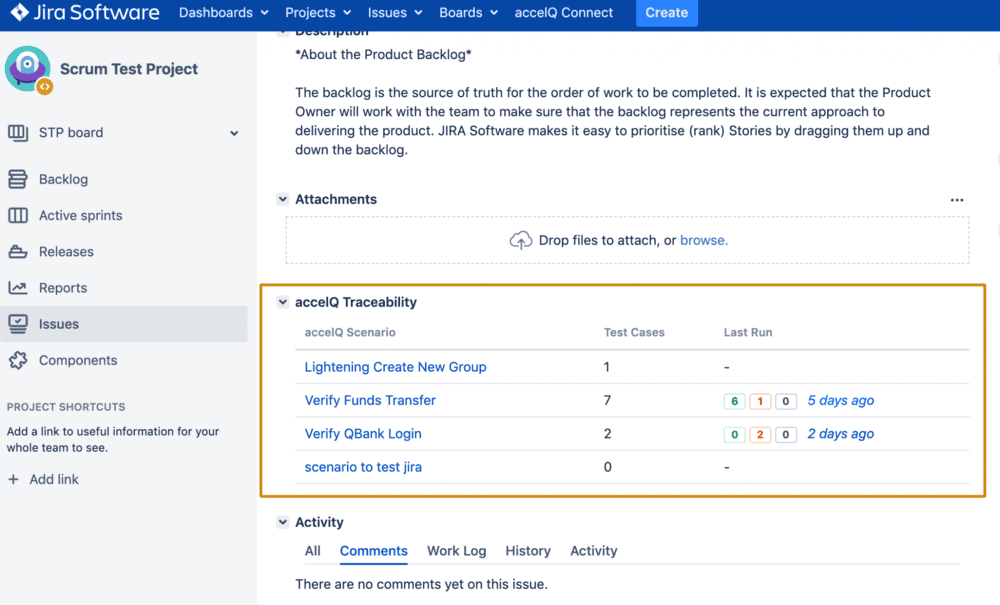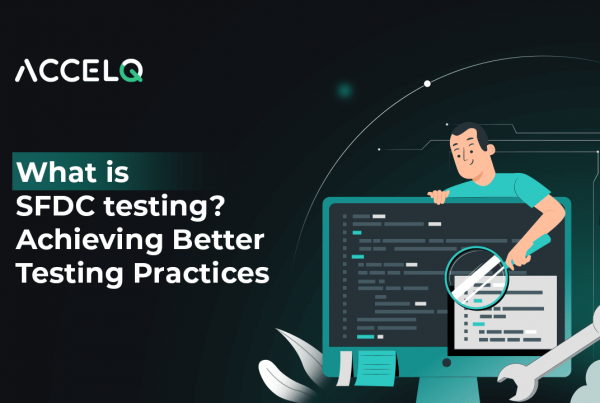Jira And Its Integration With ACCELQ

As software projects evolve in complexity, Jira stands out as an indispensable tool for managing tasks efficiently. It was developed by the Australian company Atlassian in 2002; it was originally created to support software teams in bug tracking. Today Atlassian Jira fosters collaboration, especially among teams spread across different locations ensuring that projects are delivered within set timelines and budgets.
However, in today’s interconnected digital landscape, organizations utilize multiple tools. The challenge lies in preventing these tools from operating in silos, which can disrupt workflows. This is where Jira’s strength is amplified. With a plethora of integration options available in the Atlassian marketplace, Jira can be tailored to work in harmony with most modern tools, ensuring a unified workflow. Enter Jira API.
What is Jira API?
Software developers use 3.3 tools just to discover the status of a project. Relying on multiple impacts productivity and delays time-to-resolution. The Jira API helps integration of different tools, so teams can use one centralized platform to gather all the information they need on their project — right from status updates to resolved issues and more. The JIRA API acts as a platform to interact with JIRA sever applications remotely and takes input in the form of a high-level language and converts it into machine-level language. This will help systems easily understand and execute functions requested for. The JIRA API is used to perform various functions like script interactions with JIRA, building apps, managing workflows, etc.
Since Jira APIs are easy to set up, it allows teams to start quickly, and they are better equipped to leverage modern, ready-to-use apps and features. This feature helps enhance coding efficiency, streamline IT Service Management, and improve time management with Jira.
Why Do You Need Jira API Integration?
The Jira project management tool facilitates teams to tap into modern operational capabilities – from agile boards to backlogs, roadmaps to reports, and more. But despite being all-inclusive and highly flexible, it has become imperative to extend the Jira platform for various reasons:
- Defining and integrating new field types
- Customizing out-of-the-box user formats and changing the look and feel for better user satisfaction.
- Creating new gadgets and enabling better display summaries of Jira project and issue data on dashboards
- Tweaking the Jira issue workflow and plugin new behaviors
- Adding new issue or project sections to Jira
- Enabling new services and integrating with external systems by pulling data into Jira periodically
Atlassian Jira API integration allows teams to connect to the Jira application remotely thereby helping teams use the Jira API to build and integrate the Jira application software and interact with it. Moreover, using Jira API, teams can automate repetitive tasks and workflows within Jira, build new apps, script interactions, or develop integrations with third party tools and systems while enabling seamless scalability with workflow enhancements. The Jira API integration also facilitates smooth data migration between Jira instances such as for transfer projects, issues, and configurations efficiently.
Test coverage in Jira helps determine the number of tests run, passed, failed, blocked, etc. for every feature or product requirement written in Jira as a user story, epic, or issue. Typically, it is possible to track Jira test coverage by linking user stories with their associated test cases and vice versa. Better test coverage ensures that no feature in Jira goes untested.
SUGGESTED READ - API Automation Testing with ACCELQ
What is Jira ACCELQ integration?
ACCELQ Connect is a Jira API plugin that can fetch test coverage information from ACCELQ into a Jira instance. Using ACCELQ Connect, teams can:
- Configure which type of issues and which Jira projects will show ACCELQ traceability information while setting up the ACCELQ plugin
- Set up filters to customize the list of user stories they can view and get the freedom to save and manage multiple filters
- Unearth detailed test coverage information on which test scenarios in ACCELQ are mapped against any issue
- Get the latest execution status of such scenarios and a link to navigate the detailed test report.
How Can You Enable Jira ACCLEQ Integration?
Deploying a Jira API tool like ACCELQ Connect to enable Jira integration is extremely easy. All you have to do is download the ACCELQ plugin from the Atlassian Marketplace and follow the below-mentioned steps to configure the Jira API:
- Login as Jira Administrator
- Click on the Administration icon and then select “Manage apps.”
- Click on ACCELQ Connect and provide necessary configuration information, including the ACCELQ Server URL, tenant code, ACCELQ Username, and the API key.
- Test the connection to ensure Jira can communicate with the ACCELQ server and save the profile.

Conclusion
Developing quality and bug-free software is a priority for every organization. A comprehensive platform like Atlassian Jira offers an all-round solution to track issues and manage defects, allowing teams to release high-quality software to end customers.
But despite all the features Jira offers, there is a pressing need to integrate it with a host of other software development tools within the IT ecosystem – to improve productivity and efficiency. Jira APIs are a great way to scale and extend the Jira platform that allow teams to use a unified interface to track and monitor issues, view their resolution status, and uncover traceability information. For seamless Atlassian Jira integration, the ACCELQ Connect provides the ability to get detailed information the mapping between test scenarios and issues.
The ACCLEQ Jira plugin allows teams to fetch test coverage information from ACCLEQ into their Jira instance while also getting the latest execution status of each scenario. Reach out to us for a more detailed understanding and demo for the same.
Yuvarani Elankumaran
Technical Consultant at ACCELQ
Yuvarani Elankumaran is a highly skilled technical consultant at ACCELQ. With over a decade of experience in the field of Test Automation, Yuvarani is a seasoned professional who is well-versed in a variety of programming languages and automation frameworks.
You Might Also Like:
 A quick overview of Salesforce Marketing Cloud
A quick overview of Salesforce Marketing Cloud
A quick overview of Salesforce Marketing Cloud
 What Is SFDC Testing? Achieve Better Testing Outcomes with These Best Practices
What Is SFDC Testing? Achieve Better Testing Outcomes with These Best Practices
What Is SFDC Testing? Achieve Better Testing Outcomes with These Best Practices
 Automating Your Salesforce Releases in 2023? Here’s How You Can Do It Successfully!
Automating Your Salesforce Releases in 2023? Here’s How You Can Do It Successfully!
































